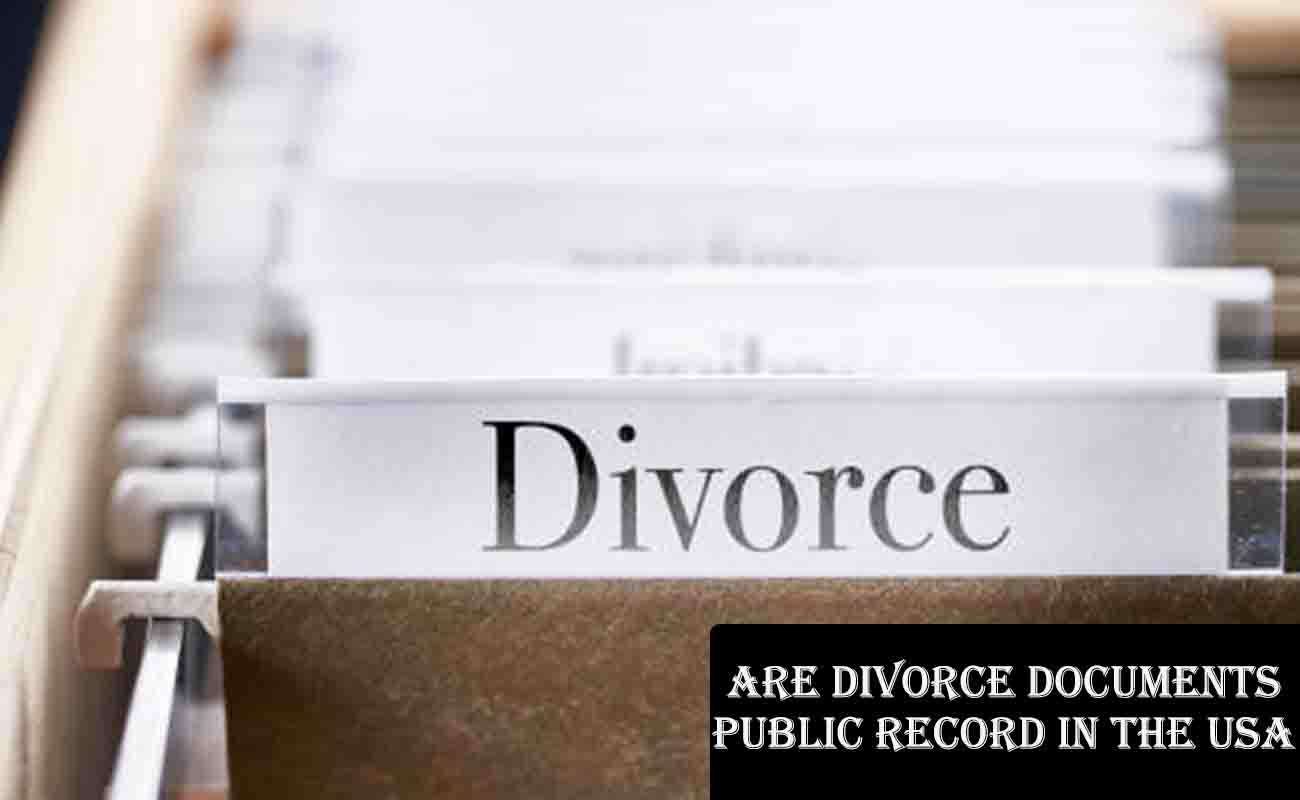When going through a divorce, privacy often becomes a primary concern. You might be wondering, are divorce documents public record in the USA? This question is crucial because it determines who can access sensitive information about your personal and financial life. As someone who has delved into this area extensively, I can tell you that the answer isn’t straightforward.

It’s a question that touches on privacy, legal rights, and the accessibility of court records. If you’re going through a divorce or simply curious about how these records are handled, you might wonder, Can someone access my divorce documents?
In the United States, the accessibility of divorce records varies depending on the type of information and the state where the divorce was filed. Divorce documents are generally considered public records, but specific details, such as financial disclosures or sensitive information about children, may be restricted.
Let’s delve deeper into this topic to clarify what is public, what isn’t, and how you can safeguard your privacy.
RECOMMENDED >>> Understanding the Five-Year Rule for Divorce in California
What Are Public Records?
Before diving into whether divorce documents are public, let’s clarify what public records are. Public records are documents or pieces of information that are not considered confidential and are accessible to the general public. In the United States, many records—such as birth certificates, marriage licenses, property deeds, and court records—fall under this category. However, there are exceptions depending on privacy laws and the nature of the documents.
Divorce records typically fall under the umbrella of public records, but specific details like financial disclosures or sensitive personal information may be restricted in certain cases.
Are Divorce Documents Public Record in the USA?
Yes, divorce documents are generally considered public records in the USA. However, the extent to which these records are accessible depends on the jurisdiction and the nature of the information within them.
Divorce proceedings are handled in family court, and like most court records, they are usually open to the public to ensure transparency. This means that, in many states, individuals can request access to certain divorce documents, such as the final divorce decree. However, access doesn’t always mean unrestricted availability, especially for sensitive details.
Why Are Divorce Records Public?
One of the reasons divorce documents are often public is transparency. The judicial system in the United States operates on the principle of open access, ensuring that court proceedings remain transparent and accountable. This means that most documents filed in court, including those related to divorces, become part of the public record.
For example, when you file for divorce, the court creates a case file. This file usually contains:
- The divorce petition.
- Financial affidavits.
- Custody arrangements, if applicable.
- The final divorce decree.
While these documents provide transparency, they may also expose personal details. Understandably, you might want to keep such information private.
What Information in Divorce Documents is Public?
When dealing with divorce, you might feel like your personal life is suddenly open for public viewing. It’s understandable to worry about exactly what information others can access. While divorce documents are often public records, not everything filed in your case is available for general viewing. Understanding what details are typically made public—and which ones are kept private—can help you navigate this process with greater peace of mind.
- Division of Property: How assets and debts were divided.
- Child Custody and Support: Details about parenting plans and financial obligations.
- Spousal Support: Any alimony arrangements.
While these details are generally accessible, courts do not typically make every piece of information public. For instance, financial affidavits containing detailed income, expenses, and asset information may be sealed in certain states.
Are Divorce Records Public in All States?
The answer to are divorce documents public records in the USA? becomes more nuanced when you look at state-specific laws. While the principle of public access applies nationwide, states have their regulations regarding what information can be accessed and by whom.
Examples of State-Specific Rules:
- California: Divorce records are public, but obtaining them requires requesting through the court or an authorized agency. Sensitive information like Social Security numbers or bank account details is redacted.
- New York: Only certain individuals, such as the parties involved, their attorneys, or those with a court order, can access divorce records.
- Florida: Divorce documents are considered public, and anyone can access them unless the court seals specific information.
If you’re unsure about your state’s laws, I recommend checking your local court’s website or consulting a legal professional.
How Can You Access Divorce Records?
If you’re wondering how to access divorce records, whether it’s your own or someone else’s, it’s important to know the steps involved. While many divorce documents are considered public records, accessing them isn’t always as simple as walking into a courthouse. There are specific methods and requirements for obtaining these records and understanding the process can save you time and effort.
- Online Court Portals: Many states provide online access to public records through court websites.
- In-Person Requests: You can visit the courthouse where the divorce was filed and request the records.
- Third-Party Services: Some private companies specialize in retrieving public records for a fee.
Keep in mind that accessing sealed records requires a court order. If you’re looking to obtain sensitive information, you’ll need to demonstrate a legitimate reason.
Can Divorce Records Be Sealed?
If you’re concerned about privacy, you’ll be glad to know that not all divorce records remain public indefinitely. Courts allow certain documents to be sealed under specific circumstances. Sealing means that the records are no longer accessible to the general public.
Common Reasons to Seal Divorce Records:
- Protecting Children: If the case involves minor children, courts may seal records to shield them from public scrutiny.
- Financial Privacy: High-net-worth individuals or those with sensitive financial information often request to seal records to protect against identity theft or financial exploitation.
- Personal Safety: In cases involving domestic violence or stalking, sealing records may protect one party’s safety.
If you wish to have your divorce records sealed, you’ll need to file a motion with the court. The judge will consider your request and decide whether the public’s right to know outweighs your privacy concerns.
When Are Divorce Records Sealed?
There are cases where divorce records are sealed, making them inaccessible to the public. Sealing a record means only authorized individuals, such as the involved parties, their attorneys, or a judge, can access the documents.
Here are some common reasons divorce records might be sealed:
- To Protect Children: If the divorce involves minor children, the court may seal records to shield them from public scrutiny.
- Sensitive Financial Information: High-profile divorces or cases involving significant assets may warrant privacy to prevent exposure of financial details.
- Abuse or Domestic Violence: If the divorce involves allegations of abuse, sealing records can protect the victim’s safety and privacy.
If you’re concerned about privacy, you can petition the court to seal your divorce records. However, courts typically require compelling reasons, as public access is a cornerstone of judicial transparency.
Tips for Protecting Your Privacy During Divorce
During a divorce, protecting your privacy is often a top concern. With the potential for sensitive information to become public, it’s important to take proactive steps to safeguard your personal details. By understanding how to manage your records and what options are available, you can reduce the chances of your privacy being compromised during this challenging time.
- Request Sealing Early: If you know privacy will be an issue, talk to your attorney about requesting a sealed record as part of your divorce proceedings.
- Avoid Sharing Sensitive Details: Be mindful of what information is included in public filings. Some details may not be legally required.
- Use Mediation or Collaborative Divorce: These methods avoid court entirely, keeping most of your documents out of the public record.
Why Are Divorce Documents Public Record?
The principle behind making court records public, including divorce documents, is to ensure transparency and accountability in the judicial system. Public access allows individuals to review court decisions and understand how laws are applied.
However, this principle must be balanced with the need for personal privacy. Courts strive to protect sensitive information while maintaining the public’s right to access legal proceedings.
Why It Matters if Divorce Records Are Public
The accessibility of divorce records can have real-world implications. For instance, employers, landlords, or nosy neighbors can potentially access your divorce details. While most people won’t go through the trouble, knowing that such information is theoretically accessible can feel unsettling.
If you’re navigating a divorce, consider the potential impact of public records and take steps to safeguard your privacy where possible.
FAQs About Divorce Documents and Public Records
Here are some FAQs About Divorce Documents and Public Records
Are All Divorce Records Public in the USA?
Not all details are public. Basic case information and final decrees are typically accessible, but sensitive information may be sealed or redacted.
How Can I Access Someone’s Divorce Records?
You can contact the county clerk’s office or use online portals to access public divorce records. However, sealed or private information won’t be accessible without authorization.
Can I Keep My Divorce Documents Private?
Yes, you can request to seal your records or redact sensitive details. Courts will consider such requests on a case-by-case basis.
Why are Divorce Records Public?
Divorce records are public to maintain judicial transparency and accountability. However, courts balance this with privacy concerns.
Are Celebrity Divorce Records Also Public?
Yes, unless sealed, celebrity divorce records are public, though courts may seal high-profile cases to protect privacy.
Conclusion: Balancing Transparency and Privacy
So, are divorce documents public record in the USA? In most cases, the answer is yes, but the level of accessibility varies depending on state laws and specific circumstances. As someone going through a divorce, it’s essential to understand what information becomes public and how you can protect your privacy.
If you’re worried about your personal information being exposed, don’t hesitate to consult a qualified attorney. They can guide you through the process, help you request sealed records, and ensure that you’re taking the necessary steps to protect yourself.
Understanding whether divorce documents are public records in the USA is essential for anyone navigating this life transition. While these records are generally accessible, courts recognize the importance of protecting sensitive information.
If you’re concerned about privacy, you have options to safeguard your personal information while complying with legal requirements. Ultimately, knowing how public records work can empower you to make informed decisions and protect your interests during this challenging time.
By staying informed, you’re better equipped to navigate the legal system and ensure your privacy is respected. Remember, the balance between transparency and privacy is key when it comes to divorce documents being public records in the USA.
ALSO, READ >>> What is a Summary Divorce? Simplified Path to Ending Marriage

